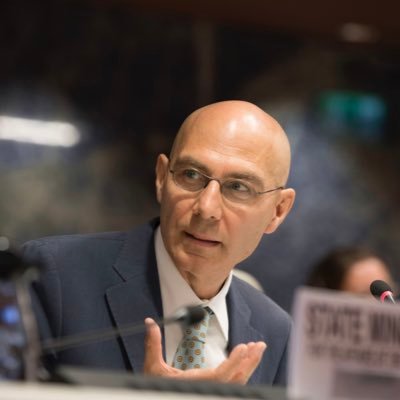
UN High Commissioner Volker Türk told the UN Human Rights Council (UNHRC) that it is only through addressing the “root causes” of the conflict and ensuring accountability for rights abuses, that Sri Lanka will see “genuine reconciliation and sustainable peace and development”.
In his oral update at the 55th session yesterday, Türk said sustainable peace and reconciliation will not be achieved in Sri Lanka "with regressive laws and authoritarian approaches".
"It is only through addressing the root causes of the country’s conflict and economic crisis, and ensuring accountability, that Sri Lanka will be able to enhance its prospects of achieving genuine reconciliation and sustainable peace and development," he said.
Türk went on to note that May 2024 will mark 15 years since the Mullivaikkal genocide in which tens of thousands of Tamils were killed by Sri Lanka's brutal military offensive in the final phase of the armed conflict. He highlighted that whilst 15 years have passed since the genocide, "violations of human rights remain unaddressed."
"Tens of thousands of families of the disappeared are still looking for their loved ones and face intimidation, arrests and violence in their search. Land disputes continue to escalate in the north and east of the country impacting on people’s livelihoods. Provincial Councils and local government bodies, that promised a measure of devolution, are not currently constituted," he added.
The UN High Commissioner urged member states to "use of universal and extra-territorial jurisdiction and targeted measures against credibly-alleged perpetrators of serious human rights violations and abuses."
Earlier this year, the Sri Lankan government introduced legislation for a Commission for Truth, Unity and Reconciliation which has been slammed by Tamil civil society, victim survivors and international human rights organisations.
Türk highlighted that "the environment for a credible truth-seeking process remains absent" as he drew attention to the ongoing surveillance and harassment of Tamil civil society, journalists and victim survivors. Tamil families of the disappeared have expressed their lack of faith in domestic mechanisms as successive governments have promised to deliver truth and justice for decades but have failed to achieve any meaningful accountability.
Just last week, three Tamil journalists were threatened by the Sri Lankan army as they attempted to cover the gathering of civilians visiting a temple within the 'High-Security Zone' in Palali Vasavilan, Jaffna. As the journalists arrived to report on the recently opened temple's public worship, they faced intimidation from the military, with their phones being confiscated and destroyed.
Turk also said he was "deeply concerned" about the reports of ongoing abductions, unlawful detention and torture by Sri Lanka's security forces which took place last year. In November 2023, Tamil community was shaken by the death of Nagarasa Alex, a 25-year-old Tamil man, who was tortured to death by the Sri Lankan police. His death sparked widespread protests demanding justice in the North-East.
He also expressed his concerns over the recent appointment of Deshabandu Tennakoon as the Inspector General of Police in Sri Lanka, an official who the Supreme Court found had personally participated in torture.
"These cases highlight the need for comprehensive security sector reform," Turk said.
Addressing the Council, Türk expressed his concern over the new bills introduced by Sri Lanka which could have a "potentially far-reaching impact on fundamental rights and freedoms, the rule of law and democratic governance."
"These include the Online Safety Act; the Anti-Terrorism Bill; the Electronic Media Broadcasting Authority Bill; and the NGO Supervision and Registration Bill – which variously strengthen the executive, grant broad powers to the security forces, and severely restrict rights to freedom of assembly, association and expression, impacting not only on civic space but the business environment."
Sri Lanka has introduced the Anti-Terrorism Bill after repeatedly promising to repeal the draconian Prevention of Terrorism Act (PTA) which has been used by the state for decades to arbitrarily detain and torture Tamils and Muslims.
The new legislation has also come under fire as it would grant authorities sweeping powers and create new speech-related offenses.
In October 2022, the UNHRC adopted resolution 51/1 on Sri Lanka, which will “extend and reinforce the capacity of the Office of the High Commissioner to collect, consolidate, analyse and preserve” evidence that may be used in future war crimes trials.
The resolution maintains that evidence collected could be used in “relevant judicial and other proceedings”, including in courts around the world, to prosecute those accused of violating international humanitarian law.
See his full statement here.
